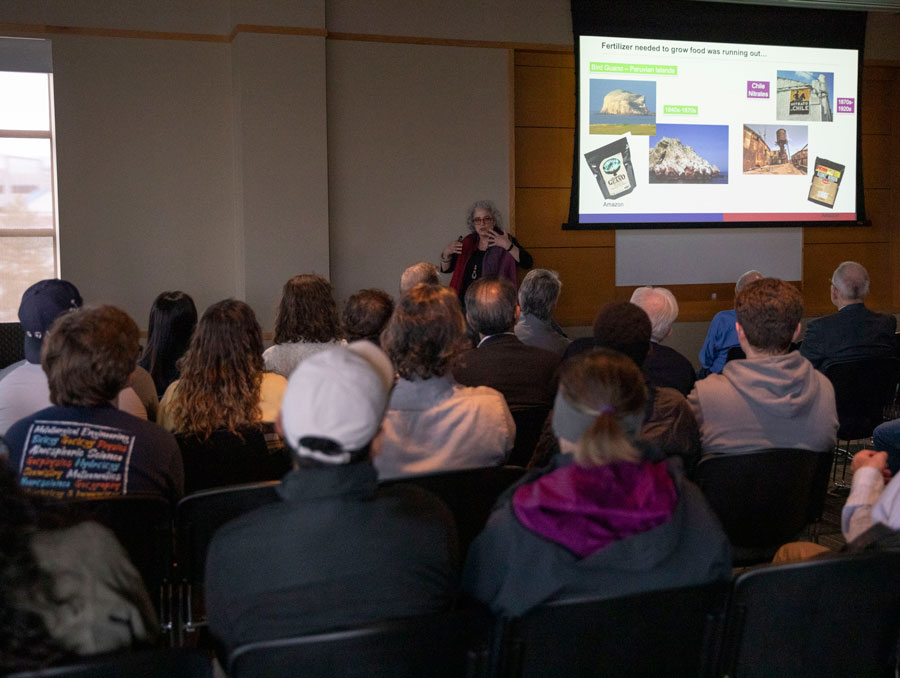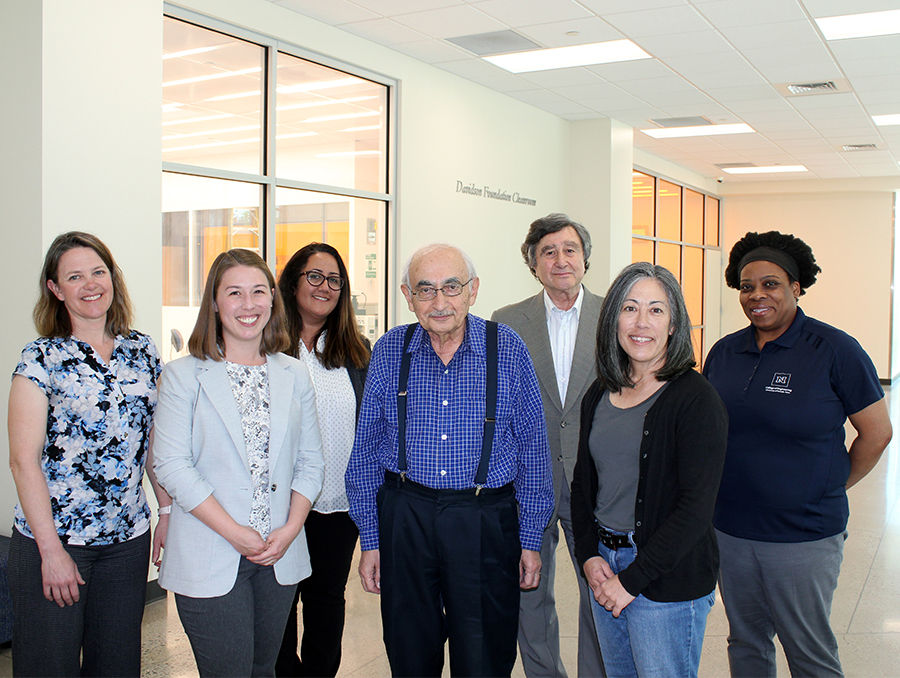University of Nevada, Reno President Milt Glick, acknowledging that the state of Nevada faces tough economic times that will necessitate further budget reductions, counseled the campus on Monday to be mindful that all potential figures are still preliminary. He said the campus will know more following this week’s meeting of the Board of Regents and a yet-to-be-determined special session this month of the Nevada State Legislature.
Glick told a town hall meeting in the Joe Crowley Student Union that Fiscal Year 2010 reductions of the University’s $221 million state appropriated budget could reach as high as $35 million.
“But it is my hope that it will be less than that,” Glick told a stand-room only crowd of about 300. In addition, about 200 others viewed the town hall meeting online. “Right now, our planning target for next year is $35 million. That is a huge amount of money. You cannot do that without substantial program displacement.”
With a special legislative session still pending – and with the intent of the session still unknown – Glick reminded the campus that any further budget reduction scenarios are still in the planning stage.
“We are being told to plan for (another round of budget cuts given the state’s reported $330 million shortfall),” Glick said. “But, we haven’t implemented anything yet.”
Glick, who was joined in his remarks by Faculty Senate Chair William Follette and Provost Marc Johnson, said that the extensive round of meetings that had been held in recent months would continue. He said if more conversations were not held, it would hurt the campus’ ability to react efficiently, and thoughtfully, to any further budget reduction requests.
“The key is, if we don’t have these conversations now, in a serious way … you will have every right to ask why these conservations were never held,” he said, promising that the campus’ leadership would continue “to invite your feedback, to invite your participation” in a process that has essentially gripped the campus since last December as the state’s economy began its accelerated downturn.
To deal with the latest shortfall, Glick said the University has been asked to prepare for budget cuts that could range anywhere from 4 to 7 to 11 percent. This is in addition to budget reductions already totaling $16 million for 2007-2008 and 2008-2009.
To date, the University has found reductions for 2009-2010 that total the following:
- $10 million base reduction
- $5 million administrative reduction/notices of non-renewals
- $2 million in buyouts
- $3 million in reduction of state appropriated budgets for the University’s more than 40 centers and institutes
- $1 million in a 5 percent reduction of operating budgets
- $2.8 million of “appropriated areas” such as University Cooperative Extension, Athletics and Business Center North
- Nearly $1 million for teaching resource management savings
- Total reduction to this point=$24.7 million.
“We still have about $10 million to go,” Glick said. “We will do our very best, for anybody whose program is affected, to make sure we have conservations with you (before any further reductions), not after.”
Glick said that given the spirit of collegiality and cooperation that has characterized the last year, he has been heartened that “thus far we have not changed the long-term trajectory of the University.”
He added, however, that future cuts could prove more difficult, as “every dollar once you have made these kinds of cuts grows harder and harder to find.”
“I worry that we are doing things that will take us decades to recover,” he said. “We are 50th in the nation in the likelihood of a 19-year-old getting a college degree. I don’t know how a state that is 50th in the nation in the likelihood of a 19-year-old getting a college degree can afford to get any worse.
“The message is the state cannot afford these huge reductions without doing serious harm.”
Still, Glick said it was important that the University continue to strive to “become a better university.” To that end, he said Johnson has been working with the executive committee of the Faculty Senate to develop a process for construction of an institutional strategic plan and academic master plan by May 2009. The hope, Glick said, is that the plans will guide the University’s future and serve as a way to help the campus re-build and re-think current strengths and weaknesses.
“It will be a serious effort,” Johnson said of the institutional strategic plan and academic master plan. “It should help answer the question, how do we reduce (given further budget reduction requests) and how to re-grow.”
Johnson added that campus participation in the process, with final drafts due to Glick and the Board of Regents by March 31, will be a necessity.
“Faculty have been involved with the process, and we want to keep it that way,” he said. “It’s your institution, too.”
Following his opening remarks, Glick spent the next hour answering questions and clarifying comments from the audience, both present and online.
Glick said that reports of a proposed mid-year tuition increase for students were erroneous. “I don’t believe we’re looking at a mid-year tuition increase,” he said. Regent Howard Rosenberg, also an art professor at the University, added that he did not think tuition increases would come at mid-year.
“No one on the board, I promise you, wants to raise tuition 25 percent, particularly next semester,” Rosenberg said, adding that 5 percent increases could be discussed at future meetings of the board. “They’re not going to be gigantic increases, all at once. Please, don’t worry about being smashed with a 50 percent or a 25 percent increase … that’s not going to happen.”
On a rumor that tenure-track faculty would be targeted for dismissal in the wake of future budget cuts, Glick issued an unequivocal “no.”
“A lot of tenure track faculty have wondered if there is a likelihood of this happening,” Glick said. “And I want this on the record: The answer is no.”
Glick was asked if any colleges would be eliminated through budget cuts, and why, if none would be, why that option was still being discussed.
Glick explained that discussion of elimination of a college or colleges was simply a way to illustrate the profound magnitude of the cuts the University has been asked to absorb.
“I don’t think we’ll eliminate colleges,” Glick said. “But I don’t think people understand the scale of the reductions. The public has to be able to understand it. It’s not meant to be empty rhetoric. It’s been meant to size the problem. Do I believe we’re going to eliminate a whole college? No.”
On possible salary reductions as a way to make budgetary ends meet, Glick said he was opposed.
“My personal opinion – more than opinion, really – is that it would require extraordinary legal efforts to reduce salary, at least unilaterally,” he said.
“Virtually all of you have contracts. And I believe these contracts are for the most part binding. I don’t believe that this year, (reducing salaries) is on the table.”
When asked about if unfavorable budget projections could mean that the University could be hit harder than other state agencies for future reductions, Glick said that he thought it was unlikely that higher education in Nevada and K through 12 in Nevada “would be treated differentially.”
Longtime Nevada Faculty Alliance leader and sociology professor James Richardson added to Glick’s comment, noting as a veteran observer of Carson City, he was “a little nervous about the meeting (involving Gov. Jim Gibbons and state legislative leadership) held last week.” (In the meeting, a plan by State Treasurer Kate Marshall to borrow $150 million from a state account to help defray the $330 million shortfall was proposed.)
Richardson said it’s still not clear if the Marshall’s $150 million plan “will pass legal muster.”
“I’m afraid all bets are off (if it doesn’t),” Richardson said.
Glick praised the campus’ students for their role over the past few months. He said, “Our students have been very appropriate by not throwing rocks or carrying flags but by communicating one-on-one with the (state’s) decision-makers … they’ve let them know how they have personally been affected by all of this.”
When asked about the $3 million in budget reductions for the campus’ more than 40 centers and institutes, Glick said that few centers or institutes will actually be shuttered.
“Few centers will go away,” he said, noting that all cuts were made in consultation between center and institute directors, the provost and deans, when appropriate. “But many centers will move their expenditures from state appropriated budgets to non-state sources. We’ll see smaller centers and our goal is they’ll become more self-sufficient.”
Although few know how the next few months will play out, Glick said that the campus should continue to stay involved with the process, and to make every effort to stay informed.
“We’re not promising you that there won’t be difficult decisions that will be made in the next six months,” he said. “What we are promising you, though, is that there will be open dialogue and discussion.
“Everything we do will have some consequences. We want to have as open a conversation as we can, with no surprises, and we want to use your creativity to come up with solutions.”
To contact Glick directly, email him at glick@unr.edu











